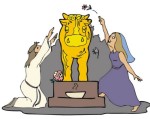 出埃及记第十三课:金牛犊:出埃及记第24章,第32章
出埃及记第十三课:金牛犊:出埃及记第24章,第32章
摩西是《圣经》里的重要人物之一。也许以下的问题会让您认识他更深,同时也可以明白圣经的一些内容。
一。出埃及记24:1-8:众人再次说他们要遵守神的___。4节:难道那时候人们已经发明了文具吗?摩西识字吗?7节:摩西又把约书拿过来,___给人民听。众人反应,说:“耶和华所吩咐的,我们都必___ ___”。
二。出埃及记24:6, 9:摩西用什么批准及颁布此“约书”?
三。出埃及记24:9-11:“摩西、亚伦、拿答、亚比户,并以色列长老中的七十人,都上了山…”。他们看见谁?请说明此事。(参看创世记32:30;出埃及记33:17-23;民数记12:8;约书亚记13章;歌罗西书1:15;提摩太前书6:15-16。)摩西,亚伦等人见到了一件罕见的,昙花一现的现象;参看哥林多后书12:1-4。
四。出埃及记24:12-18:神要为摩西做什么?谁陪摩西上山?摩西在山上多久?好像只有摩西独自一人进入___ ___中。此事让我们想到一位之后要来到世界上的谁?17节:“耶和华的___ ___在山顶上,在以色列人眼前,形状如烈___”。摩西害怕吗?(参看希伯来书12:18-21。)
五。出埃及记32:1-4:老百姓很快就忘记了神的什么?他们很快就准备违反十条诫命中的第___条诫命。谁与他们合作?你认为亚伦为什么这样做?难道亚伦要离开真神吗?亚伦向百姓要什么东西?亚伦把这些“用雕刻的工具雕刻,铸造了一个___像”。百姓(并非亚伦)说:“以色列啊,这就是你们的___,就是把你从埃及地领出来的那位”。到目前为止,他们已违反了几条诫命?也许亚伦没有意思让百姓向此牛犊下拜。有些解经家认为亚伦本来的目的是让金牛当作台座,给真神立在上面(如约柜的作用)。
六。出埃及记32:5:“亚伦看见了,就在___ ___面前筑了一座祭坛”。也许亚伦要改变众人的想法和行动,所以他宣布说, “明日是___ ___ ___的节日”。亚伦醒悟过来了,想要把众人的焦点改为耶和华神,但是亚伦太___了。你认为在这件“众人犯罪”事情上,亚伦是“有罪”或“无罪”?
七。 出埃及记32:6-14:“人民… 就坐下吃喝,起来玩耍”。以色列人采取迦南地人宗教仪式(包括淫乱、纵酒宴乐等罪)。亚伦一旦开始放他们任意行动,他毫无办法把他们挽回来。这种行动害谁?人民又犯了第几条诫命?谁把此消息告知摩西?神的反应有二,是什么?摩西又如何的改变神的想法?从中我们知道神有情感以及摩西很是什么样的人?
八。出埃及记32:15-18:形容摩西手中拿的那东西是什么。“约书亚听见人民呼喊的声音的时候”,他以为是什么声音?但, 摩西纠正他,说是什么声音?
九。出埃及记32:19-24:“摩西走近营前的时候,看见了那___ ___,又看见了有人歌舞,他就发怒,把两块法版从他的手中___ ___,在山下把它们摔碎了。又把他们所做的那牛犊拿过来,用火焚烧,磨到___ ___,撒在___面上,让以色列人____”。摩西问了亚伦,“这人民向你作了什么,___竟使他们陷在大___里呢?”所以,摩西不认为亚伦没有___ ___。亚伦提出哪两个借口回答摩西?亚伦犯了十诫的哪条诫命?你认为神为什么没有惩罚亚伦?
十。出埃及记32:26-35:谁“属”耶和华?请解释第29节的意思;多看几个不同的翻译本。基督徒怎么接受,怎么解释27至29节?30节:他们的罪能够被赦免吗?32节:摩西再次表示出他的内心如何的___ ___。33节:神说,每一个人都要为自己的罪负___ ___。34节:神答应摩西什么,好鼓励他?最后,“在[神]追讨的日子,[神]必追讨他们的____”。(现代中文译本:“…我要差天使在你前面引导你。可是时候将到,我要惩罚他们所犯的罪”。)当天,如果您我在场,我们的结局会怎么样?我们会属于神吗?或者不属于神?活或死?
读者:欢迎您把这篇短文下载,复印,用在您的《圣经》班里。
Bible Study Questions: Exodus Lesson Thirteen
Exodus 24 and 32: The Golden Calf
1. Exodus 24:1-8: Once again the people said that they would obey God’s _____. Vs.4: Had writing instruments already been invented? ____. Could Moses write? ____. Vs. 7: Moses took “the Book of the Covenant and r___ it to the people.” They responded: “We will do everything the LORD has said; we will o____.”
2. What did Moses use to ratify and promulgate (put into effect) the Book of the Covenant”? B____.
3. Ex. 24:9-11: “Moses and Aaron, Nadab and Abihu, and the seventy elders of Israel went up and saw the God of Israel.” Explain this. (See Gen. 32:30; Ex. 33:17-23; Num. 12:8; Joshua 13; Col. 1:15; 2 Tim. 6:15-16. What Moses, Aaron and others saw was a rare phenomena indeed; see 2 Cor. 12:1-4.
4. Ex. 24:12-18: What did Moses do? Who accompanied Moses up the mountain? How long was Moses on the mountain? It seems that Moses was alone when he entered the the c____ . Vs. 17: To the Israelites the g____ of the LORD looked like a consuming f____ on top of the mountain.
5. Ex. 32:1-4: What did the people quickly forget? What commandment did they quickly break? Who cooperated with them in this? Why do you think Aaron did this? Did Aaron want to forsake the real God? For what did Aaron ask the people? Aaron used these things and made them “into an idol cast in the shape of a calf, fashioning it with a tool.” The people (not Aaron) said: “These are your gods, O Israel, who brought you up out of Egypt.” Up to this point, what commandments had they broken? Perhaps Aaron did not intend for the people to worship the golden calf. Some Bible scholars think that Aaron’s purpose was for the gold calf to act as a pedestal on which the true God would be set (as was the function of the ark of the covenant). (See Clyde M. Woods, The Living Way Commentary on the Old Testament, vol. 1: Genesis-Exodus, p. 211.)
6. Ex. 32:5: When Aaron saw this, he built an altar in front of the c___.” Perhaps Aaron wanted to change the people’s thinking and actions, so he announced, “Tomorrow there will be a festival to the L___.” Aaron woke up and wanted to change the focus of the people to Jehovah, but it was too l____. Do you think Aaron was “guilty” or “not guilty” in this sin of the people?
7. Ex. 32:6: “…the people …sat down to eat and drink and got up to indulge in revelry.” The Israelites adopted religious practices of the Canaanites (which included sexual activity and orgies, etc). Once Aaron allowed the people to go their own way, there was no way for him to bring them back. Who is hurt by this type of action? Now what commandment have the people broken? Who told Moses about this situation? Ex. 32:9-14: What was God’s reaction (two things)? How did Moses change God’s thinking? From this we know that God has emotion and that Moses is what kind of a person?
8. Ex. 32:15-16: Describe the items Moses was carrying in his hands. Ex. 32:17-18: “When Joshua heard the noise of the people shouting,“ he thought it was the sound of w____. Moses corrected him however and said it was the sound of ______________________.
9. Ex. 32:19-24: “When Moses approached the camp and saw the calf and the dancing, his a_____ burned and he threw the tablets out of his hands, breaking them to pieces at the foot of the mountain. And he took the calf they had made and burned it in the fire; then he ground it to p_____, scattered it on the water and made the Israelites d_____ it.” Moses asked Aaron, “What did these people do to you, that y____ led them into such great s___?” And so Moses did not think Aaron was without r__________ in this matter. What two excuses did Aaron give Moses? What commandment did Aaron break? Why do you think God did not punish Aaron?
10. Ex. 32:26-35: Who was “for” the Lord? Explain vs. 29; read it in several translations. How can Christians accept and explain vs. 27-29? Vs. 30: Could their sins be forgiven? Once again we see Moses exhibit what quality? Vs. 33: God said that each person must take re_________ for his own sins. Vs. 34: What did God tell Moses as an encouragement to him? Eventually, “when the time comes for [God] to punish, [God] will punish them for their s___.” Had we been present on that day, what would have been our end? Would we have been “for” God or not? Alive or dead?
圣经问答
出埃及记第十三课:金牛犊:出埃及记24章,32章
Bible Study Questions: Exodus Lesson Thirteen
Exodus 24 and 32: The Golden Calf
作者:谢德华 ©By Edward Short
本文所问的问题使用汉子圣经。
欢迎您把此文下载用在圣经班或私人学习。
A series of Bible lessons, written in Chinese
and based largely on the text of the Chinese Bible.
You may download and print copies of this lesson
for use in your Bible class.
World Christian Broadcasting
Franklin, TN 37067 USA
